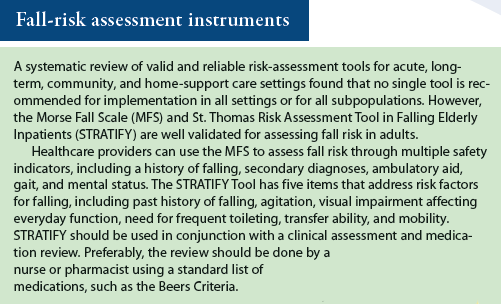All About Dementia Fall Risk
All About Dementia Fall Risk
Blog Article
Not known Incorrect Statements About Dementia Fall Risk
Table of ContentsThe Single Strategy To Use For Dementia Fall RiskGet This Report about Dementia Fall RiskHow Dementia Fall Risk can Save You Time, Stress, and Money.Some Known Details About Dementia Fall Risk The 10-Second Trick For Dementia Fall Risk
Make sure that there is a marked area in your clinical charting system where staff can document/reference scores and document appropriate notes associated to drop prevention. The Johns Hopkins Fall Risk Evaluation Device is one of lots of devices your staff can utilize to help prevent adverse clinical events.Client drops in health centers prevail and devastating unfavorable events that linger regardless of years of effort to minimize them. Improving interaction across the analyzing registered nurse, care team, client, and person's most entailed loved ones might reinforce loss avoidance efforts. A group at Brigham and Female's Health center in Boston, Massachusetts, looked for to establish a standard loss avoidance program that centered around boosted interaction and client and family members interaction.

The technology team emphasized that effective application depends on individual and personnel buy-in, combination of the program into existing workflows, and fidelity to program processes. The team kept in mind that they are facing exactly how to guarantee connection in program application during durations of dilemma. During the COVID-19 pandemic, for example, an increase in inpatient drops was related to restrictions in client engagement along with restrictions on visitation.
Dementia Fall Risk Fundamentals Explained
These cases are typically taken into consideration avoidable. To apply the treatment, organizations require the following: Access to Loss pointers sources Loss ideas training and retraining for nursing and non-nursing team, consisting of new registered nurses Nursing workflows that enable client and household interaction to conduct the drops assessment, make sure usage of the prevention strategy, and perform patient-level audits.
The results can be extremely destructive, frequently increasing patient decline and creating longer health center remains. One research study approximated stays increased an extra 12 in-patient days after a person fall. The Autumn TIPS Program is based on engaging clients and their family/loved ones throughout 3 major procedures: analysis, customized preventative interventions, and auditing to make sure that people are taken part in the three-step fall prevention process.
The client assessment is based upon the Morse Fall Range, which is a verified autumn threat analysis device for in-patient medical facility setups. The range consists of the 6 most usual factors individuals in health centers fall: the client autumn history, high-risk conditions (including polypharmacy), use of IVs and other external gadgets, mental standing, gait, and wheelchair.
Each threat factor relate to several workable evidence-based treatments. The registered nurse produces a strategy that includes the treatments and shows up to the care team, patient, and family on a laminated poster or published visual aid. Registered nurses create the strategy while consulting with the person and the person's family members.
Top Guidelines Of Dementia Fall Risk
The poster offers as an interaction device with other members of the patient's treatment team. Dementia Fall Risk. The audit component of the program consists of examining the client's understanding of their risk aspects and avoidance plan at the device and health center degrees. Nurse champions perform at the very least 5 individual meetings a month with clients and their family members to inspect for understanding of the loss prevention plan

An estimated 30% of these drops outcome in injuries, which can range in seriousness. Unlike other unfavorable events that need a standardized clinical response, loss prevention depends very on the requirements of the patient. Consisting of the input of individuals that know the patient ideal enables for greater customization. This technique has confirmed to be extra efficient than loss prevention programs that are based primarily on the manufacturing of a risk rating and/or are not adjustable.
Dementia Fall Risk Things To Know Before You Buy

Based upon auditing outcomes, one website had 86% compliance and 2 websites had over 95% conformity. A cost-benefit analysis of the Fall pointers program in eight medical facilities approximated that the program expense $0.88 per client to apply and led to savings of $8,500 per 1000 patient-days in straight prices associated with the prevention of 567 tips over 3 years and eight months.
According to the technology team, organizations interested in implementing the program should perform a readiness analysis and falls avoidance gaps evaluation. 8 Additionally, organizations must ensure the required facilities and operations for implementation and establish an application strategy. If one exists, the organization's go to this web-site Fall Avoidance Job Pressure need to be involved in planning.
Not known Facts About Dementia Fall Risk
To start, organizations ought to ensure completion of training components by registered nurses and nursing aides - Dementia Fall Risk. Hospital team need to examine, based upon the requirements of a medical facility, whether to make use of an electronic wellness document printout or paper version of the loss avoidance plan. Implementing groups must recruit and educate nurse champs and establish procedures for auditing and reporting on autumn data
Staff require to be associated with the procedure of upgrading the workflow to involve individuals and household in the evaluation and prevention strategy procedure. Systems must be in place so that devices can comprehend why an autumn happened and remediate the reason. Much more specifically, nurses ought to have channels to provide continuous comments to both team and system leadership so they can adjust and enhance fall avoidance process and communicate site here systemic issues.
Report this page